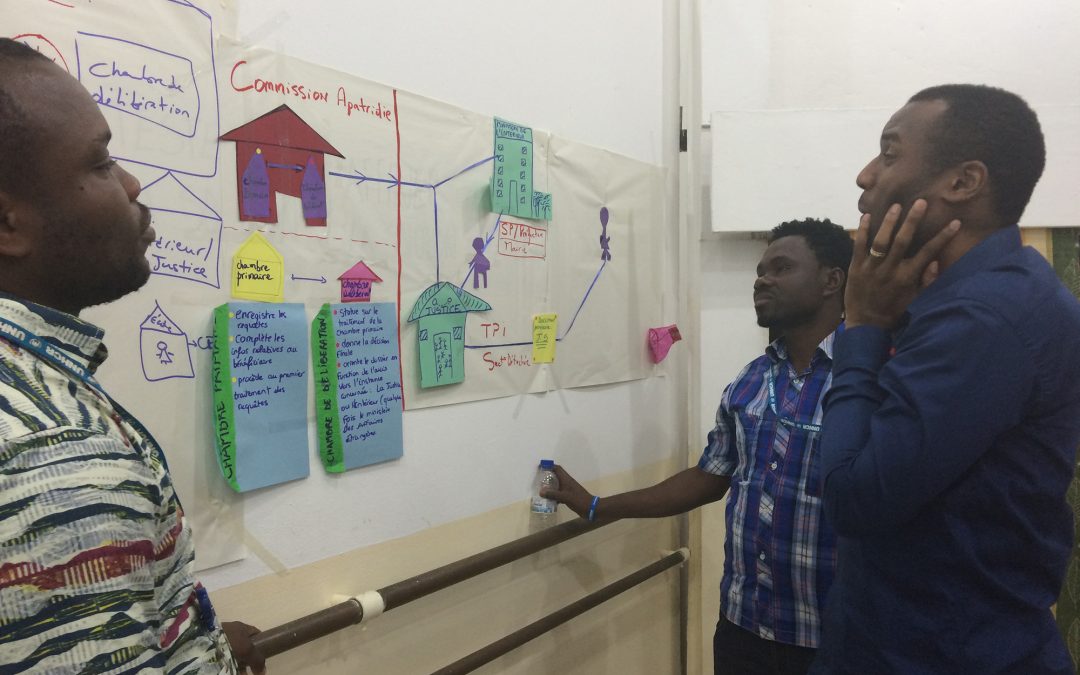Alpha Diallo was perhaps not the most obvious employee among his colleagues in Abidjan to take on the role of Innovation Fellow. As Head of Administration and Finance at UNHCR’s operation in Côte d’Ivoire, he wasn’t in daily contact with persons of concerns. But he had a hunch that shaking up assigned roles and pushing staff to get out of their comfort zone was just what the operation needed to see fresh ideas bubble up. His work over the past few months has served to prove his point.
A few years ago, Alpha discovered the work of Ideo, a design firm known for its human-centered approach to solving social problems, and was intrigued by the organization’s methods for designing and scaling projects. These methods could likely help the agency incubate new projects to improve its assistance to persons of concerns, he thought. When the Innovation Fellowship was announced, he noticed the program would be using principles that aligned with Ideo’s. The decision to apply was a no-brainer. “It was the perfect opportunity to contribute to changing an organization that is over half a century old,” he recalls.
As a newly minted Fellow, Alpha got to attend an intensive, yet ludic one-week workshop on innovation in Bangkok, Thailand, upon which he returned to Abidjan to resume his usual duties. As a Fellow, he was also expected to tackle his chosen innovation challenge and disseminate his newly acquired skills across the operation and its partner organizations. “We do ask a lot from them,” admits Emilia Saarelainen, Innovation Fellows Coordinator in Budapest. “They’re really superstars.”
Based on feedback from his manager, who happens to be the country representative in Côte d’Ivoire (Mohamed Toure), and from other colleagues, Alpha chose to work on one of the most pressing issues faced by the Côte d’Ivoire operation: – Statelessness. An estimated 700,000 people living in the country are stateless or at risk of statelessness, meaning they have no citizenship or nationality. Among them are undocumented migrants and their descendants, foundlings, trafficked individuals and internally displaced persons. Without proper documentation, they cannot readily access public services, own property, open a bank account or seek formal employment.
Resolving and preventing statelessness is a priority for UNHCR, which has launched a 10-year global campaign to support states toward the reduction of statelessness. But Côte d’Ivoire lacks the legal framework that would allow its stateless people to access citizenship, and is only starting to put in place the response mechanisms that would enable government actors, civil society organizations and UN agencies to address those cases effectively.
Alpha believed the innovation process would be well suited to structure the creation of a referral system for stateless and at-risk cases. Using the knowledge he had learned during the innovation workshop in Bangkok, he invited UNHCR staff from Côte d’Ivoire and the region, high government officials from Côte d’Ivoire and Senegal, NGO partners and a former stateless person to take part in a two-day workshop last August. They brainstormed, proposed and discussed solutions, built scenarios and even drew storyboards to illustrate their concepts. None of the participants were previously familiar with these techniques, but by the workshop’s end, they were able to generate two tangible “solutions” that could be further prototyped by the Côte d’Ivoire office.
The first one was to set up a database on the various information regarding stateless individuals and those at risk of statelessness collected by the field units and partners. The second, more of an institutional nature, was aimed at strengthening the government’s ability to manage those cases and handle coordination between relevant governmental institutions. Both will be refined and implemented throughout 2017.
The workshop’s benefits extend beyond these two initiatives. The non-hierarchical structure of the event provided participants with a rare opportunity to collaborate on equal footing, thus providing them with a safe space where they could speak freely. “We told them to let loose,” Alpha recalls. This relaxed environment was conducive to creativity, ultimately yielding ideas that none of the stakeholders had previously thought of. Many of them, including government workers, said they’d use the same methods again within their own teams.
Innovation has now become a second nature for Alpha, who says he often uses the two main ingredients of human-centred design – empathy and prototyping – in his daily work, and encourages his colleagues to do the same. As the current Fellowship comes to an end, Alpha joins the ranks of a growing body of alumni who dedicate part of their time to changing the culture of one of the oldest humanitarian organizations ever created. And the knowledge of innovation, its principles and its processes, is slowly trickling down, from UNHCR’s Innovation Service in Geneva to each and every field unit. “Many of us are moving around the agency,” Alpha explains. “When the number of UNHCR staff who know and utilize innovation tools will reach a critical mass, that’s when cultural change will be imprinted within the agency.”
We’re always looking for great stories, ideas, and opinions on innovations that are led by or create impact for refugees. If you have one to share with us send us an email at [email protected]
If you’d like to repost this article on your website, please see our reposting policy.

